Related Research Articles

Liberia, officially the Republic of Liberia, is a country on the West African coast. It is bordered by Sierra Leone to its northwest, Guinea to its north, Ivory Coast to its east, and the Atlantic Ocean to its south and southwest. It has a population of around 5 million and covers an area of 43,000 square miles (111,369 km2). English is the official language, but over 20 indigenous languages are spoken, reflecting the country's ethnic and cultural diversity. The country's capital and largest city is Monrovia.

Liberia is a country in West Africa founded by free people of color from the United States. The emigration of African Americans, both free and recently emancipated, was funded and organized by the American Colonization Society (ACS). The mortality rate of these settlers was the highest in accurately recorded human history. Of the 4,571 emigrants who arrived in Liberia between 1820 and 1843, only 1,819 survived (39.8%).
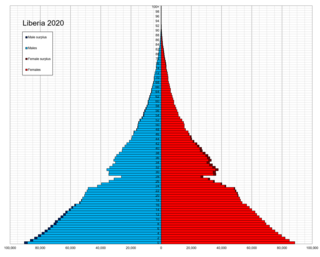
As of 2006, Liberia has the highest population growth rate in the world. 43.5% of Liberians were below the age of 15 in 2010. With recent civil wars being fought along ethnic lines, Liberia is a multiethnic and multicultural country.

The Politics of Liberia takes place in a framework of a presidential representative democratic republic modeled on the government of the United States, whereby the President is the head of state and head of government; unlike the United States, however, Liberia is a unitary state as opposed to a federation and has a pluriform multi-party system rather than the two-party system that characterizes US politics. Executive power is exercised by the government. Legislative power is vested in both the government and the two chambers of the legislature.
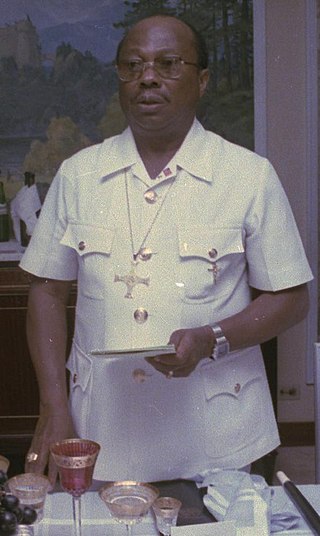
William Richard Tolbert Jr. was a Liberian politician who served as the 20th president of Liberia from 1971 until 1980.

The People's Redemption Council (PRC) was a governmental body that ruled Liberia during the early 1980s. It was established after the 1980 Liberian coup d'état wherein Samuel Doe seized power on 12 April 1980. The Council, with Doe as its chairman, promised a complete overhaul of Liberia's society, economy, and political system and the replacement of the corruption of previous regimes with respect for the rights of the Liberian people. The PRC had 17 founding members and was later expanded to 28. The PRC initially functioned as the executive and legislative body in Doe's government. However, over time Doe consolidated power as a central executive. In 1984, the PRC was dissolved and replaced by the Interim National Assembly.
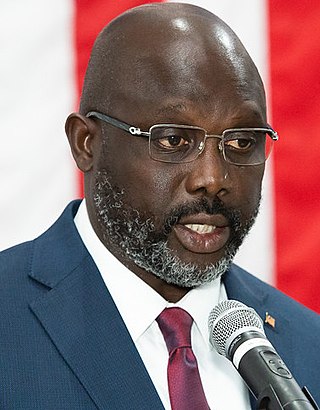
George Tawlon Manneh Oppong Ousman Weah is a Liberian politician and former professional footballer who is the incumbent president of Liberia, serving in office since 2018. Prior to his election to the presidency, Weah served as Senator from Montserrado County. He played as a striker in his prolific 18-year professional football career, which ended in 2003. He is the first African former professional footballer to become a head of state.

The music of Liberia uses many tribal beats and often one of the native dialects, or vernacular. Liberian music includes traditional Gbema music, as well as the popular genre Hipco.

The Unity Party (UP) is a political party in Liberia that was started in 1984 by Edward B. Kesselly, also its first standard bearer. Officially founded at Buchanan in Grand Bassa County, the party was established on 27 July 1985. The Unity Party participated in the first elections after the 1980 coup, running against President Samuel Doe in October 1985. The party has remained active in Liberian politics since and was, until 2017, the ruling party.
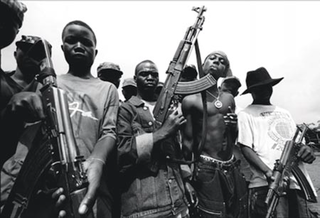
The Second Liberian Civil War was a conflict in the West African nation of Liberia that lasted from 1999 to 2003. It was preceded by the First Liberian Civil War, which ended in 1996.
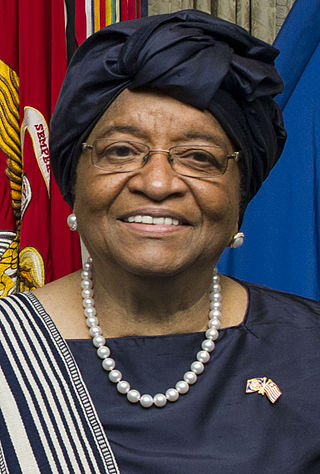
Ellen Johnson Sirleaf is a Liberian politician who served as the 24th president of Liberia from 2006 to 2018. Sirleaf was the first elected female head of state in Africa.

The United Nations Mission in Liberia (UNMIL) was a peacekeeping operation established in September 2003 to monitor a ceasefire agreement in Liberia following the resignation of President Charles Taylor and the conclusion of the Second Liberian Civil War (1999–2003). At its peak it consisted of up to 15,000 U.N. military personnel and 1,115 police officers, along with civilian political advisors and aid workers.

Jewel Cianeh Taylor is a Liberian politician who is currently serving as the 30th vice president of Liberia. She was married to convicted warlord and former president Charles Taylor and was First Lady of Liberia during his presidency. In 2005, Jewel Taylor was elected to the Senate of Liberia for Bong County as a member of the National Patriotic Party. She served as the Chairperson of the Senate Health and Social Welfare Committee on Gender, Women and Children.

Liberian Americans are an ethnic group of Americans of full or partial Liberian ancestry. This can include Liberians who are descendants of Americo-Liberian people in America. The first wave of Liberians to the United States, after the slavery period, was after of the First Liberian Civil War in the 1990s and, then, after the Second Liberian Civil War in the early 2000s.

Liberia – United States relations are bilateral relations between Liberia and the United States.
Christianity is the predominant religion in Liberia, with Protestantism being its largest denomination. Muslims are the largest minority group, largely coming from the Mandingo and Vai ethnic groups. The vast majority of Muslims are Malikite Sunni, with sizeable Shia and Ahmadiyya minorities.
Americo-Liberian people or Congo people or Congau people in Liberian English, are a Liberian ethnic group of African American, Afro-Caribbean, and liberated African descent. The sister ethnic group of Americo-Liberians are the Sierra Leone Creole people, who share similar ancestry and related culture. Americo-Liberians trace their ancestry to free-born and formerly enslaved African Americans who emigrated in the 19th century to become the founders of the state of Liberia. They identified there as Americo-Liberians. Some African Americans following resettlement in Canada also participated as founding settlers in Sierra Leone and other Recaptive repatriates settled in present-day Côte d'Ivoire.

Hipco, also referred to as HipCo or co, is a genre of hip hop from Liberia. It has been described by The Guardian as Liberia's "unique musical style" using "vernacular speech and political messages."
Capital punishment is a legal penalty in Liberia. However, Liberia is classified as "Abolitionist in Practice." Liberia last executed in 2000.

France-Liberia relations are the bilateral relations between France and Liberia.
References
- ↑ Senah, Gbatemah (February 7, 2018). "Weah Makes More Appointments as Senate Continues Confirmation Hearings".